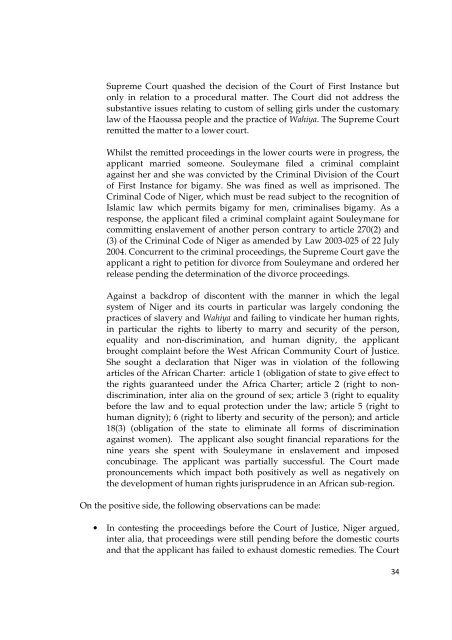sexual health and human rights in the african region - The ICHRP
sexual health and human rights in the african region - The ICHRP
sexual health and human rights in the african region - The ICHRP
You also want an ePaper? Increase the reach of your titles
YUMPU automatically turns print PDFs into web optimized ePapers that Google loves.
Supreme Court quashed <strong>the</strong> decision of <strong>the</strong> Court of First Instance but<br />
only <strong>in</strong> relation to a procedural matter. <strong>The</strong> Court did not address <strong>the</strong><br />
substantive issues relat<strong>in</strong>g to custom of sell<strong>in</strong>g girls under <strong>the</strong> customary<br />
law of <strong>the</strong> Haoussa people <strong>and</strong> <strong>the</strong> practice of Wahiya. <strong>The</strong> Supreme Court<br />
remitted <strong>the</strong> matter to a lower court.<br />
Whilst <strong>the</strong> remitted proceed<strong>in</strong>gs <strong>in</strong> <strong>the</strong> lower courts were <strong>in</strong> progress, <strong>the</strong><br />
applicant married someone. Souleymane filed a crim<strong>in</strong>al compla<strong>in</strong>t<br />
aga<strong>in</strong>st her <strong>and</strong> she was convicted by <strong>the</strong> Crim<strong>in</strong>al Division of <strong>the</strong> Court<br />
of First Instance for bigamy. She was f<strong>in</strong>ed as well as imprisoned. <strong>The</strong><br />
Crim<strong>in</strong>al Code of Niger, which must be read subject to <strong>the</strong> recognition of<br />
Islamic law which permits bigamy for men, crim<strong>in</strong>alises bigamy. As a<br />
response, <strong>the</strong> applicant filed a crim<strong>in</strong>al compla<strong>in</strong>t aga<strong>in</strong>t Souleymane for<br />
committ<strong>in</strong>g enslavement of ano<strong>the</strong>r person contrary to article 270(2) <strong>and</strong><br />
(3) of <strong>the</strong> Crim<strong>in</strong>al Code of Niger as amended by Law 2003-025 of 22 July<br />
2004. Concurrent to <strong>the</strong> crim<strong>in</strong>al proceed<strong>in</strong>gs, <strong>the</strong> Supreme Court gave <strong>the</strong><br />
applicant a right to petition for divorce from Souleymane <strong>and</strong> ordered her<br />
release pend<strong>in</strong>g <strong>the</strong> determ<strong>in</strong>ation of <strong>the</strong> divorce proceed<strong>in</strong>gs.<br />
Aga<strong>in</strong>st a backdrop of discontent with <strong>the</strong> manner <strong>in</strong> which <strong>the</strong> legal<br />
system of Niger <strong>and</strong> its courts <strong>in</strong> particular was largely condon<strong>in</strong>g <strong>the</strong><br />
practices of slavery <strong>and</strong> Wahiya <strong>and</strong> fail<strong>in</strong>g to v<strong>in</strong>dicate her <strong>human</strong> <strong>rights</strong>,<br />
<strong>in</strong> particular <strong>the</strong> <strong>rights</strong> to liberty to marry <strong>and</strong> security of <strong>the</strong> person,<br />
equality <strong>and</strong> non-discrim<strong>in</strong>ation, <strong>and</strong> <strong>human</strong> dignity, <strong>the</strong> applicant<br />
brought compla<strong>in</strong>t before <strong>the</strong> West African Community Court of Justice.<br />
She sought a declaration that Niger was <strong>in</strong> violation of <strong>the</strong> follow<strong>in</strong>g<br />
articles of <strong>the</strong> African Charter: article 1 (obligation of state to give effect to<br />
<strong>the</strong> <strong>rights</strong> guaranteed under <strong>the</strong> Africa Charter; article 2 (right to nondiscrim<strong>in</strong>ation,<br />
<strong>in</strong>ter alia on <strong>the</strong> ground of sex; article 3 (right to equality<br />
before <strong>the</strong> law <strong>and</strong> to equal protection under <strong>the</strong> law; article 5 (right to<br />
<strong>human</strong> dignity); 6 (right to liberty <strong>and</strong> security of <strong>the</strong> person); <strong>and</strong> article<br />
18(3) (obligation of <strong>the</strong> state to elim<strong>in</strong>ate all forms of discrim<strong>in</strong>ation<br />
aga<strong>in</strong>st women). <strong>The</strong> applicant also sought f<strong>in</strong>ancial reparations for <strong>the</strong><br />
n<strong>in</strong>e years she spent with Souleymane <strong>in</strong> enslavement <strong>and</strong> imposed<br />
concub<strong>in</strong>age. <strong>The</strong> applicant was partially successful. <strong>The</strong> Court made<br />
pronouncements which impact both positively as well as negatively on<br />
<strong>the</strong> development of <strong>human</strong> <strong>rights</strong> jurisprudence <strong>in</strong> an African sub-<strong>region</strong>.<br />
On <strong>the</strong> positive side, <strong>the</strong> follow<strong>in</strong>g observations can be made:<br />
• In contest<strong>in</strong>g <strong>the</strong> proceed<strong>in</strong>gs before <strong>the</strong> Court of Justice, Niger argued,<br />
<strong>in</strong>ter alia, that proceed<strong>in</strong>gs were still pend<strong>in</strong>g before <strong>the</strong> domestic courts<br />
<strong>and</strong> that <strong>the</strong> applicant has failed to exhaust domestic remedies. <strong>The</strong> Court<br />
34
















